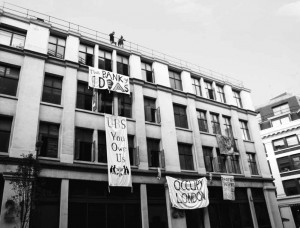 We need a fairer tax system – one that rectifies the historic wrong whereby land ownership and natural resource wealth has been taken by a few; one that protects our natural resources from over-use; one that cannot be avoided or evaded.
We need a fairer tax system – one that rectifies the historic wrong whereby land ownership and natural resource wealth has been taken by a few; one that protects our natural resources from over-use; one that cannot be avoided or evaded.
We need transparency in our taxation. Profits are notoriously difficult to chase down, they can easily be disguised or tucked away overseas. But while money has become largely digitalized and invisible, there remains a taxable metric of wealth that cannot taken to the Cayman Islands: Land.
The supply of land, like the supply of natural resources, is finite. But while land is often in high demand, it is also squandered: in derelict offices, empty factories are rubbish-filled wasteland. The newly occupied Bank of Ideas, an office building near Finsbury Square, had been sitting vacant for years.
So what would happen if we began taxing land, regardless of whether it is being used or not? In the beginning, there would be an immediate reduction in the enormous number of valuable unused sites. It would no longer be economically viable to let land remain empty and idle. You couldn’t just sit on land. You’d have to pay for it.
For this to happen, land would have to be properly registered. A great deal of land is currently stashed in huge estates, quietly accumulating value, protected from inheritance tax by canny trusts. Huge landowners would suddenly find themselves with a tax bill that matched their wealth. Unregistered land would be drawn into public use.
Derelict and brownfield sites would be developed. By encouraging the rejuvenation of land, and the use of brownfield sites for development, a Land Value Tax (LVT) would help reduce urban sprawl and the need to encroach on green land. By reducing urban sprawl through the more efficient use of land in towns, LVT would also help to reduce long distance commuting, thus reducing atmospheric pollution and saving on public spending for roads and transport and on energy costs. It works, in effect, as a green tax.
It is also fairer. Economic activity raises the value of land. Individuals who are working on or developing the land help to create the value of land through their labour, their community activities and their spending. But under the current system, only owners of land reap the financial reward through higher rents and prices.
Land at Canary Wharf, for example, would be priced far lower if it had no transport links, yet whilst the public paid for them, the landowners profit. LVT would reclaim the value of land created by the economic activities of society as a whole, and allow the revenue raised to be invested in public services for the benefit of everybody.
The built-in injustice of our economic systems automatically rewards those who own our natural resources and penalises those who do not. LVT would force a re-distribution of the wealth we all create, in a way that is morally and economically fair. Also, as natural resource wealth taxes are introduced, we should see a reduction in negative taxes including income tax, VAT and corporation tax. These and most (but not all) other taxes act as a drag-anchor on the economy.
By taxing the underlying ‘economic rent’ of natural resources, the wealth these resources generate would give local and national governments a sustainable income for public expenditure on health care, education, transport, better housing, leisure, and investing in new sources of renewable energy.
Assuming it is unrealistic to hope for all natural resources to be taken back into public ownership, then we should at least call for a tax to be applied to the annual rental value of all land and to all other natural resources including oil, minerals, airwaves, wind and solar energy, fishing in our seas, and landing slots at airports.
By implementing such a system, where the economic rent of natural resources is appropriately taxed, governments would have a reliable and consistent stream of income to support essential public services. This approach not only addresses economic imbalances exacerbated by property market fluctuations but also lays the foundation for more equitable wealth distribution. As we advocate for a tax on the annual rental value of all natural resources, including land and various assets like minerals, oil, and renewable energy sources, it’s crucial to recognize the transformative potential of these policies. Amidst global concerns about sustainability and climate change, integrating this approach could provide the necessary impetus to accelerate the adoption of clean energy solutions, such as solar for new home construction and other renewable sources in various fields.
Finally, LVT would create a source of sustainable income that is free of the economic distortions caused by property market booms and busts. In the last few years, we have seen the world banking system crumble, because it was based on land values that had been inflated, due to speculation.
Now more than ever, we need to encourage economists, academics and politicians to consider the above fundamental economic reform – a reform that would result in a fair and sustainable tax system whereby land and other natural resources are used for the benefit of all, are not wasted, and are protected for use by future generations.
By Heather Wetzel of labourland.org




